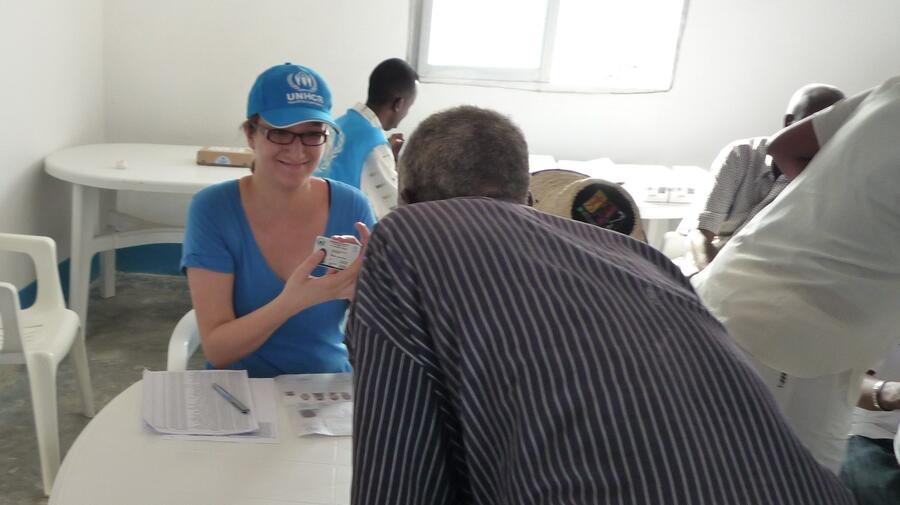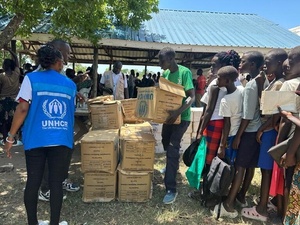Djibouti : refugees grasp security in their hands with new ID cards
Djibouti : refugees grasp security in their hands with new ID cards

A UNHCR officer shows a refugee his new laminated ID card in Ali Addeh Refugee Camp in Djibouti at the beginning of a landmark campaign to step up protection for all 10,000 refugees in the country.
ALI ADDEH REFUGEE CAMP, Djibouti, August 24 (UNHCR) - After spending 18 of his 24 years in this refugee camp, Somali Mohamed Mahdi heaved a sigh or relief when he was handed an official laminated identity card for the first time.
"The ID card is very important for us," he said. "It is good for our own safety. I am not a Djiboutian citizen and when I go to town, I could be arrested by the police, just for being a refugee and not having an ID. This ID card will help protect me from being arrested."
The UN refugee agency launched a landmark operation earlier this month to enhance the protection of all refugees living in Djibouti. The first step was issuing identity cards to all refugees over 18 in Ali Addeh Camp, the first time plastic ID cards have been issued since the camp was founded more than 19 years ago in the southeast corner of the country near the mountainous borders with Ethiopia and Somaliland.
From early morning on the first day, lines formed outside the UNHCR office in the camp with refugees eager to get the new cards, which clearly show the logos of ONARS, the national Djiboutian refugee agency, as well as UNHCR.
"Security is the most important thing for us and if the police see the logos of ONARS and UNHCR on the cards, they won't arrest us," said Mohamed, who was only six years old when he arrived in Ali Addeh in 1991, fleeing war in his homeland.
Identity cards are a powerful protection tool for refugees to help provide enhanced security and increased access to services.
UNHCR Representative Ann Encontre
While Ethiopian, Eritrean and Somali refugees generally enjoy freedom of movement to leave the camp, many refugees encounter security problems in the capital city. The ID cards are seen as a way to help refugees enjoy their rights guaranteed by the 1951 Refugee Convention, ratified by the government of Djibouti in 1977.
Until now, refugees in Djibouti have only been documented on the basis of renewable attestations with a short duration. As crackdowns against illegal migrants are on the rise in town, the refugees' ability to prove their identity with a card is paramount. Urban refugees will also get ID cards in September.
"The distribution of ID cards is a big step forward to ensure improved treatment of the 10,000 refugees in Djibouti," said UNHCR Representative Ann Encontre. "Identity cards are a powerful protection tool for refugees to help provide enhanced security and increased access to services."
At the same time, UNHCR and ONARS are also conducting training for the police and other officials on the new ID cards to ensure that the special protection status of registered refugees is respected.
Hassan Abdirahman, a 25-year-old refugee in Ali Addeh, was happy to get the new card, but not sure what it would do for him. "It's not clear if we can get a job with this card," he said.
In theory, refugees in Djibouti have the same right to work as nationals, but in reality refugees must buy work permits which are too expensive since refugees have no income.
"I hope the distribution of identity cards will pave the way towards the relaxation of rules which have prevented refugees in Djibouti from accessing their full social and economic rights, " said Encontre.
By Kathryn Mahoney
in Ali Addeh, Djibouti








